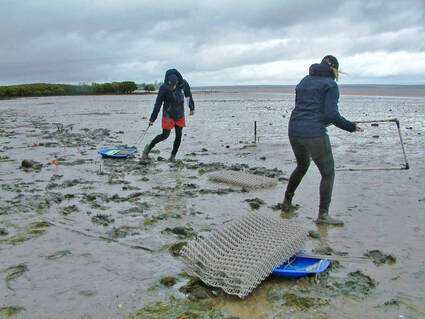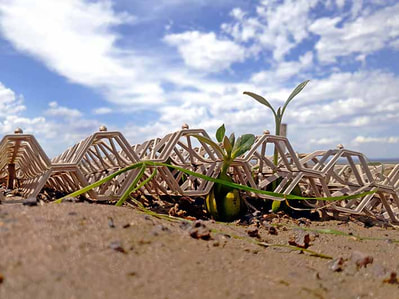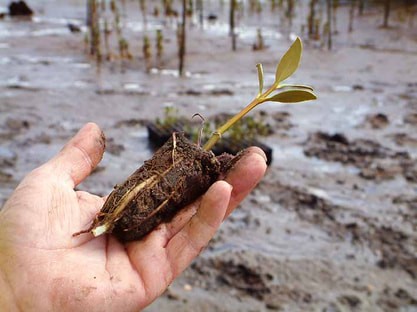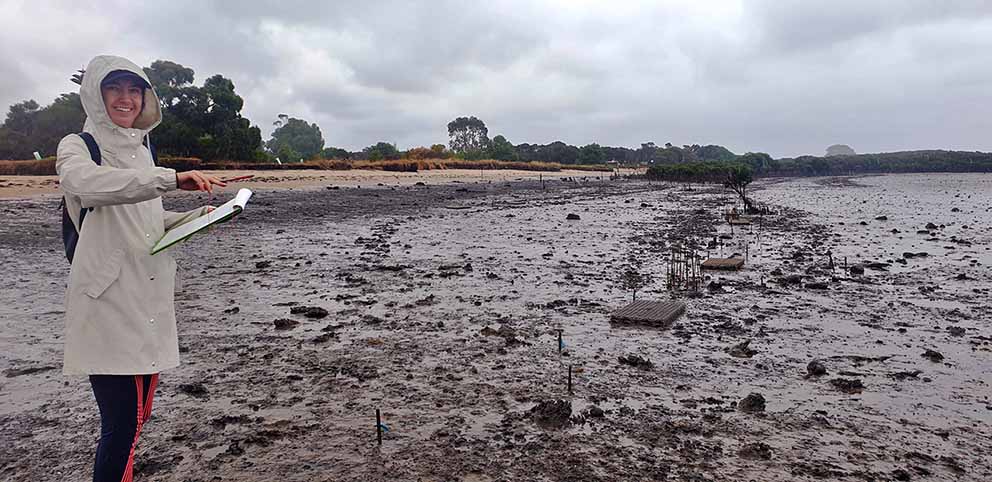By Neil Daly
WEDNESDAY 12 October, 2022. The rain was pelting down; the wind had destroyed my flimsy umbrella but Jason Noonan and I had a job to do: counting mangroves as part of the citizen scientist mangrove restoration program we had just started.
On such a day, only the dedicated or the fool-hardy would be walking along the Queensferry foreshore. Perhaps we were both, so it was a surprise to see three, wet-weather-protected figures in the gloomy distance.
It turned out they were from Deakin University’s Blue Carbon Lab.
Dr Stacey Trevathan-Tackett introduced the team and described how they were trialling the use of biodegradable structures (the mesh frame) as part of their work to help restore degraded coastal wetlands in Port Phillip Bay and Western Port. Known as Regenerating Our Coasts and partnered with Beach Energy, it is a three-year project undertaking research to help restore blue carbon ecosystems and accelerate coastal restoration. The capture and storage of carbon dioxide by coastal wetlands, mangroves, salt marshes and seagrass is known as blue carbon.
As the conversation continued, it seemed like this encounter was meant to be.
It was apparent that our mangrove project could now offer the local community the chance to work with the scientists and help them develop their nature-based research project and expand Queensferry’s carbon capture potential.
The next time we met, the Blue Carbon Lab team was deploying the mesh frames. It was November 2022; the weather was a little kinder.
 Thank goodness, Mum still washes my clothes, quipped one of the researchers. Photo: Neil Daly
Thank goodness, Mum still washes my clothes, quipped one of the researchers. Photo: Neil Daly  If you see these structures set out along the foreshore at low tide,
If you see these structures set out along the foreshore at low tide, please don't disturb them or their trial markers.
Photo: Blue Carbon Lab, Deakin University
Dr Trevathan-Tackett is right in saying they have a long way to go, for it’s now over 20 years that experimental mangrove restoration programs have been taking place along the eastern arm of Western Port – from Lang Lang to Tenby Point.
Unfortunately, those undertaking this work have not been able to demonstrate the feasibility of growing mangroves on a large-scale basis along this coastline and this is the crux of the problem.
 It can take up to ten years for a mangrove to reach a metre in height. Photo: Neil Daly
It can take up to ten years for a mangrove to reach a metre in height. Photo: Neil Daly There is a pressing need to come up with a solution for time is no longer on our side.
To address the issue, I propose Deakin University’s Blue Carbon Lab initiates a Mangrove Restoration Symposium without delay.
The invitation list should include Melbourne Water, The University of Melbourne, Western Port Seagrass Partnership, Western Port Biosphere Reserve Foundation, Bass Coast Landcare Network and OzFish.
In various ways, these organisations have been involved in mangrove restoration and research projects for many years now, and it seems prudent that their work and Deakin University’s blue carbon project be discussed in an open forum with a view to finding a united way forward. Its outcome should include:
- a fully-costed mangrove implementation business plan underpinned by measureable outcomes;
- a timetable of events and expected finishing dates for the nominated projects;
- a proposal to involve coastal landholders and farmers whose land is already, or potentially, a wetland or saltmarsh environment;
- a compliance and assurance reporting process; and
- a proposed funding arrangement taking into account things such as the Nature Repair Market Exposure Draft and The Accounting for Nature Framework.
The catalyst for my call to action is climate change.
The Federal Government and the Victorian State Government should note the situation, for until there are many hectares of mangroves growing along the eastern arm of Western Port, the blue carbon project in this region may remain a goal that never delivers its intended outcome.
